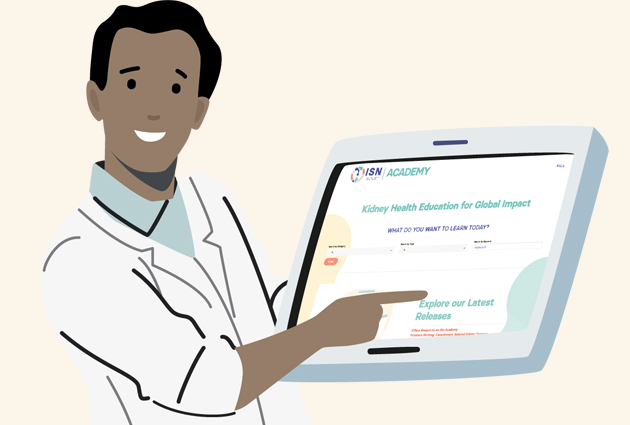KDIGO Diabetes in CKD Guideline Webinar: Looking at the Latest Evidence and Beyond

ISN is pleased to invite you to the KDIGO Diabetes in CKD Guideline Webinar: Looking at the Latest Evidence and Beyond, to be held on Monday, June 22, 2020 at 06:00 PM CEST.
Join the webinar to learn more about the new KDIGO Guideline on Diabetes Management in CKD, focusing on topics such as glycemic monitoring and targets, lifestyle and anti-hyperglycemic interventions, and approaches to self-management and optimal models of care.
Speakers
Chairperson
 Ian de Boer, MD, MS
Ian de Boer, MD, MS
(Work Group Co-Chair)
Ian H. de Boer is Professor of Medicine and adjunct professor of epidemiology at the University of Washington in Seattle, WA, USA. Dr. de Boer received his medical degree from Oregon Health Sciences University. He trained in internal medicine at the University of California, San Francisco, and in nephrology at the University of Washington, where he also earned a master’s degree in epidemiology. Dr. de Boer practices nephrology at the Puget Sound Veterans Affairs Healthcare System and is an associate director of the Kidney Research Institute at the University of Washington.
Dr. de Boer’s research focuses on the prevention, diagnosis, and treatment of diabetic kidney disease (DKD) and its complications. His epidemiology work has helped define the clinical course of kidney disease in types 1 and 2 diabetes, including prevalence, incidence, risk factors, outcomes, relationships with cardiovascular disease, and the impact of diabetes treatments; his additional work also employs patient-oriented physiology research and clinical trials. Dr. de Boer has published more than 300 manuscripts in the field and was elected to the American Society for Clinical Investigation for these research contributions. He served on the American Diabetes Association Professional Practice Committee from 2016-2019, chairing the complications subgroup which oversaw development of the Standards of Medical Care in Diabetes, and is currently deputy editor of the Clinical Journal of the American Society of Nephrology.
I am text block. Click edit button to change this text. Lorem ipsum dolor sit amet, consectetur adipiscing elit. Ut elit tellus, luctus nec ullamcorper mattis, pulvinar dapibus leo.
| Date: June 22, 2020 Time: 6:00 PM CEST |
| Register Now |
| To learn more, watch the video introduction to the new KDIGO Diabetes Guideline below. |
Living with Diabetes and CKD
 Tami Sadusky, MBA
Tami Sadusky, MBA
(Work Group Member)
Tami Sadusky received a pancreas and kidney transplant in 1993 and a second kidney transplant in 2011. She was diagnosed with type 1 diabetes at the age of 13 and, within 20 years, had developed complications from the disease, including kidney failure. The transplants brought her a new life.
Tami received her BS and MBA degrees prior to moving to Washington, where she worked at the University of Washington (UW) for 22 years as executive director of Research Finance and Operations. She is now an active volunteer in the areas of organ donation and transplantation and has been invited to speak about her patient experience both pre- and post-transplant. She is on the board of directors for Transplant House, a non-profit organization that provides housing for transplant patients. She is an active member of the UW Transplant Advisory Council, the UW Kidney Education and Support Group, the UW Team Transplant Strategic Planning and Finance Committee, the Kidney Research Institute Advisory Council, and works closely with the Northwest Kidney Centers. Three years ago, Tami established a UW gift fund, the Sadusky Diabetes Kidney Research Fund, which supports diabetes and kidney research.
Tami has been involved with KDIGO for the past two years developing the KDIGO Clinical Practice Guideline for Management of Diabetes and Chronic Kidney Disease.
Management of Diabetes in CKD
 Peter Rossing, MD, DMSc
Peter Rossing, MD, DMSc
(Work Group Co-Chair)
Peter Rossing is a clinician researcher devoted to complications in diabetes with a focus on renal and cardiovascular complications. He obtained a specialist degree in internal medicine and endocrinology in 2004. Since 2007, he has been a chief physician and manager of the Steno Diabetes Center research team dedicated to the research of micro and macrovascular complications of diabetes.
As a professor in diabetic angiopathy at the University of Copenhagen since 2012, Dr. Rossing has conducted epidemiological studies investigating key features of the pathophysiology of the diabetic kidney at different stages. He has identified several markers for the development of diabetic nephropathy, making it possible to predict individual risk. Dr. Rossing has been involved in several intervention studies in patients with overt diabetic nephropathy aiming at improving the prognosis.
He is the coordinator of the EU FP7 project, PRIORITY, demonstrating that urinary proteomics can be used to stratify the prevention of renal complications in type 2 diabetes, and the Novo
Nordisk Foundation grant, PROTON, aiming at personalizing prevention of diabetic nephropathy.
He has co-authored over 420 papers, and his h-index is 69. He received the Minkowski prize in 2005, the Golgi prize in 2016 (both from the European Association for the Study of Diabetes [EASD]), and the E. Bierman award from the American Diabetes Association (ADA). Dr. Rossing has also served as president of the Danish Endocrine Society and the European Diabetic Nephropathy Study group, and as chairman of the Danish National Diabetes Registry.
Management of CKD in Diabetes
 Katherine R. Tuttle, MD, FASN, FACP, FNKF
Katherine R. Tuttle, MD, FASN, FACP, FNKF
(Work Group Member)
Katherine R. Tuttle is the executive director for research at Providence Health Care, co-principal investigator of the Institute of Translational Health Sciences, and professor of medicine at the University of Washington, USA. Dr. Tuttle earned her medical degree and completed her residency in Internal Medicine at Northwestern University School of Medicine in Chicago, Illinois. She was a fellow in Metabolism and Endocrinology at Washington University in St. Louis, Missouri. Her Nephrology fellowship training was performed at the University of Texas Health Science Center in San Antonio, Texas.
Dr. Tuttle’s major research interests are in clinical and translational science for diabetes and CKD. She has published over 200 original research contributions and served two terms as Associate Editor for the Clinical Journal of the American Society of Nephrology and the American Journal of Kidney Disease. Dr. Tuttle has received many honors and awards, including the Medal of Excellence from the American Association of Kidney Patients, Garabed Eknoyan Award from the NKF, the YWCA Woman of Achievement Award in Science, and two Outstanding Clinical Faculty Awards at the University of Washington. Dr. Tuttle served on the Board of Directors for the Kidney Health Initiative and has chaired numerous kidney and diabetes-related working groups and committees for organizations including the National Institute of Diabetes and Digestive and Kidney Diseases (NIDDK)/NIH, the NKF, the American Society of Nephrology, the ISN, and the ADA.










